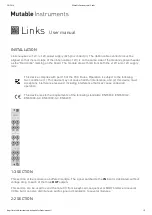
8
Installation considerations
damaging drivers in a sound-reinforcement system (whether you’re doing auditorium, church, or club sound
engineering, or are a mobile DJ, or like to push the limits of your home’s audio entertainment
center). Set the
1046 for limiting (Hard Knee mode On, with a RATIO of 10:1 or greater) and adjust the THRESHOLD to provide
15 dB or more of compression (just a few dB below the input clip). For low-level signals, the 1046 won’t change
gain, but if large signals come along, the gain will be reduced to prevent clipping and save sensitive system
components from excessive heat buildup or other types of damage.
Note:
PeakStopPlus™ Limiting can also be used to prevent speaker damage.
Preventing Digital Recording Overload
Some digital recorders and samplers produce audible distortion when they exceed their maximum operating level.
The 1046 can be used to ensure that audio input does not overload a digital recorder’s A/D (analog-to-digital)
converters. The 1046 can perform this function quietly enough for all digital media. To use the 1046 so that no
changes in gain occur unless an emergency arises (wildly excessive levels), set Hard Knee mode On, the RATIO to
∞
:1, and the THRESHOLD highest level before digital overload.
Note:
PeakStopPlus™ limiting can also be used to prevent raucous-sounding digital overload
.
Installation Considerations
Hookups and Cabling:
The 1046 is designed for nominal -10 dBV or +4 dBu levels. The 1046 can be used with
either balanced or unbalanced sources and the outputs can be used with either balanced or unbalanced loads,
provided the proper cabling is used.
Normal Balanced Connections for Inputs and Outputs
Connection
XLR
TRS 1/4” Jack
Ground:
Pin 1
Sleeve
High:
Pin 2
Tip
Low:
Pin 3
Ring
Normal Unbalanced Connections for Inputs and Outputs
Connection
XLR
TRS 1/4” Jack
TS 1/4” Jack
Ground:
Pin 1
Sleeve
Sleeve
High:
Pin 2
Tip
Tip
Low (ground):
Pin 3
Ring
Sleeve
Tie pin 3 to the ground for unity gain in/out of the 1046 when using unbalanced input connections to
balanced output connections or balanced input connections to unbalanced output connections. To do
otherwise won’t hurt the unit but will result in unmatched input to output levels, and the level control will
not be properly calibrated.


































